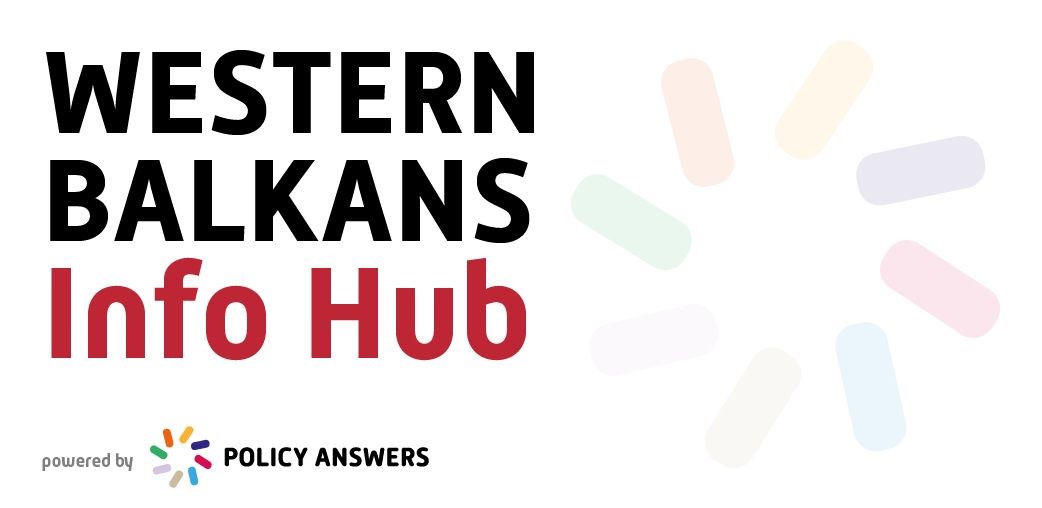

Project, network, platform; ongoing, planned for 4 years, from March 2022 to February 2026.
EUSDR Priority Area(s): PA 7 Knowledge Society, PA 8 Competitiveness of Enterprises, PA 10 Institutional Capacity & Cooperation Submitted by: PA 7
The Western Balkans Info Hub is currently (March 2022-February 2026), provided by the Horizon Europe funded project, called POLICY ANSWERS, which deploys a vast array of tools – from high-level meetings to information services, from pilot activities to policy recommendations on key innovation issues – to support a better integration of the Western Balkans into the European Research Area (ERA).
The project aims at continuing and scaling up the common efforts of the European Union and the Western Balkans – Albania, Bosnia and Herzegovina, Kosovo*, Montenegro, North Macedonia and Serbia – for cooperation on Innovation, Research, Education, Culture, Youth and Sport. The background of the project is the enlargement policy and association of the WB to Horizon Europe and inclusion to the European Research Area, Higher Education Area etc. The goal is to ultimately foster stability and prosperity while strengthening the European perspective of the region.
The focus on the Western Balkans (WB) allows for a contribution both to the EU Strategy for the Adriatic-Ionian Region (EUSAIR) as well as to the EUSDR (as foreseen in the project plan).
Led by the Centre for Social Innovation (ZSI) in Vienna and involving 14 partner institutions, the project builds on the solid ground created by successful past experiences, including WBC-INCO.NET and Danube-INCO.NET.
The Western Balkans Steering Platforms (WB SPs) for Research & Innovation and Education & Training have been playing a central role in stimulating, monitoring and supporting the cooperation in research, education and innovation between the EU Member States, the European Commission and the WB in EU funded programmes and beyond for several decades. Regular platform meetings, including at Ministerial level, are bringing a multitude of stakeholders together to identify common priorities, discuss latest policy and reforming measures, decide on spin-off activities and follow-up measures as well as on topics for regional cooperation with EU assistance.
Past efforts supported by the EU have also built widely-used information hubs and services: from websites and social media to monthly newsletters, which provide high quality targeted information on research, technology and innovation in, with and for the WB but also touching upon education, culture, youth and sports.
Objectives
The project runs from March 2022 until February 2026 and focuses, among many things, on the following activities:
- Organising policy dialogue events such as Ministerial and Steering Platform meetings as well as ad-hoc policy coordination meetings, offering room for exchange about policy implementation.
- Supplying an information hub and web platform, www.westernbalkans-infohub.eu, addressing R&I, Education, Culture, Youth and Sport in the WB to enable better information sharing, creating opportunities for joint actions and get the WB closer to EU policy making.
- Carrying out analytical activities such as mapping of relevant institutions, programmes, initiatives, needs and common priorities in the WB, and monitoring ongoing activities related to the implementation of the WB Agenda on Innovation, Research, Education, Culture, Youth and Sport.
- Designing informed policy recommendations to decision makers in the region, addressing the EU’s key priorities such as: digitalisation, green economy and health, and aligning them.
- Implementing regional pilot activities which reach out directly to academia, industry and civil society, in order to strengthen links between academia and industry in the WB region, and to support mobility of researchers within the area. Targeted actions will also be taken to increase the visibility of WB research infrastructures in the wider European research landscape.
At all stages of the project, special emphasis is put on the inclusion of so-far underrepresented groups and the coordination with key stakeholders and international organisations.
With its ambitious and wide-ranging work programme, POLICY ANSWERS aims at impacting on science, economy and society, thus contributing to a faster recovery from the COVID-19 crisis and to the digital and green transitions in the WB.
POLICY ANSWERS supports policy makers, researchers, students, innovators, entrepreneurs, underrepresented groups and therefore improves the framework conditions for building the knowledge society, especially in the non-EU countries of the Danube Region. The project activities contribute to the EUSDR PA 7 actions and targets with its strong focus on the following aspects: policy dialogue in the R&I field, stakeholder mapping, capacity building in accordance with the identified national needs, academia-industry links, mobility of researchers and youth, open access to research infrastructure, education in the field of R&I, alignment of priorities in the fields of Digital Transformation and Green Agenda.
POLICY ANSWERS also contributes to the competitiveness of enterprises (PA 8) with its policy dialogue and policy briefs, the planned “Regional Innovation Academy” and with the regional support scheme for academia-industry cooperation.
Finally, the project activities are in line with PA 10 in terms of supporting better coordination of funding (via policy dialogue) and strengthening institutional capacities (via capacity building activities).
Need and (expected) impact
Policy coordination in the knowledge area is needed.
Other project aspects relevant for the EUSDR:
- Coordination of activities between the WB and the EU Member States, e.g. via organisation of Steering Platform meetings
- Funding coordination via pilot activities, e.g. joint regional support schemes
- Sharing of information in relation to available funding, in particular Horizon Europe, EUREKA, COST, etc.
- Strengthen cooperation along Priority Areas (digitalisation, green deal / green agenda, healthy societies)
- Increase awareness about R&I from the target countries (partially overlapping with the Danube Region)
- Organisation of activities (including a conference) bringing together business and academia
- Cooperation with stakeholders including clusters, Digital Innovation Hubs, etc.
Macro-regional dimension
From the Danube Region, the following countries are represented in the project: Austria, Croatia, Germany, Bosnia and Herzegovina, Montenegro and Serbia.
Beyond the Danube Region, Italy, Albania, Kosovo and North Macedonia are represented in the project.
Generally, the project aims at involving more EU Member States and promote the WB in the EU.
Stakeholders involved
The Information Hub invites all regional stakeholders to use its service to disseminate results, funding and participation opportunities, event announcements, news, documents, etc. The Project Advisory Board includes several partners from different EC Services (including DG R&I, DG JRC, DG GROW, DG REGIO, DG CNCT, DG NEAR, etc.) as well as the Regional Cooperation Council. It is embedded in the stakeholder network of the Steering Platform including e.g. COST, EUREKA, CEI, Berlin Process, etc.
The project ecosystem aims at mobilising and coordinating broader networks, and acts as a true info hub or respectively builds a network of networks. Cooperation with EUSDR actors is therefore highly appreciated.
Budget and Funding
Estimated budget for the POLICY ANSWERS project: EUR 4.993.109
Further information
Contact
Elke Dall, dall@zsi.at; policy-answers@westernbalkans-infohub.eu
___________________________
* This designation is without prejudice to positions on status, and is in line with UNSCR 1244/1999 and the ICJ Opinion on the Kosovo declaration of independence.


